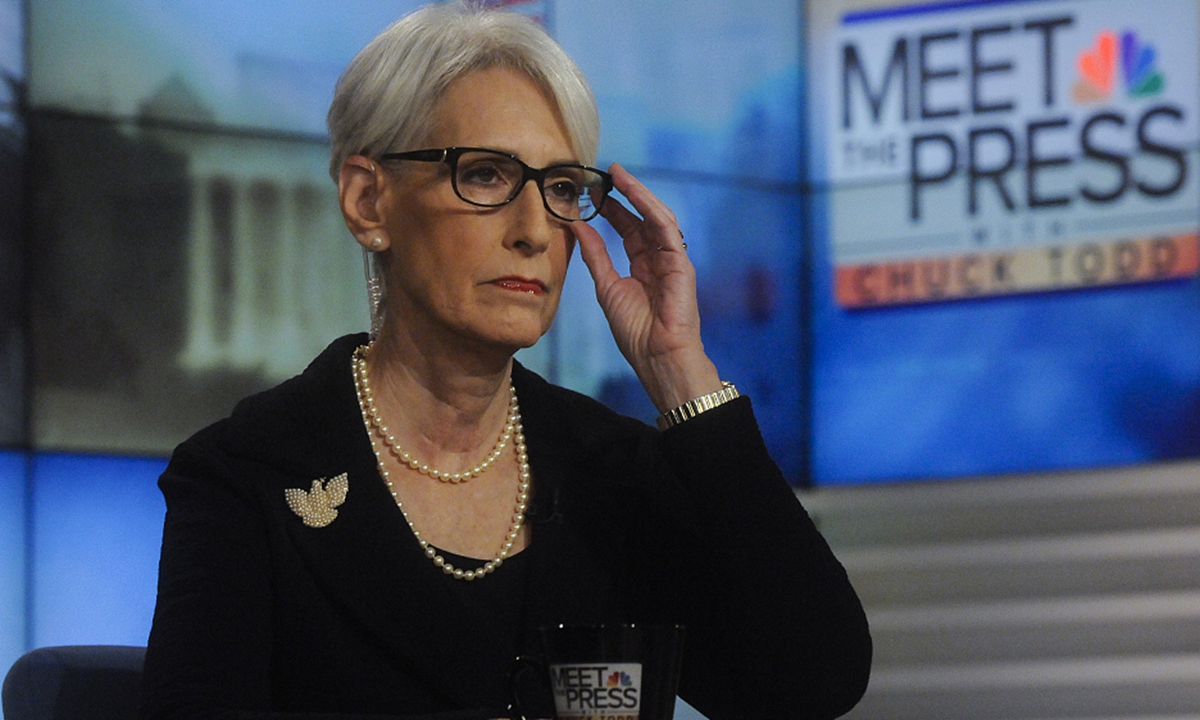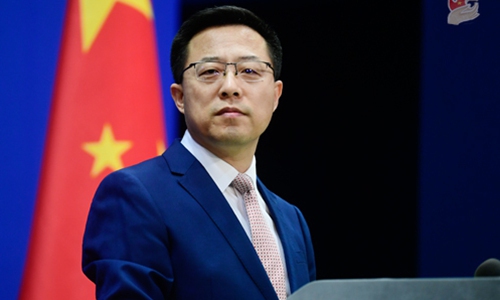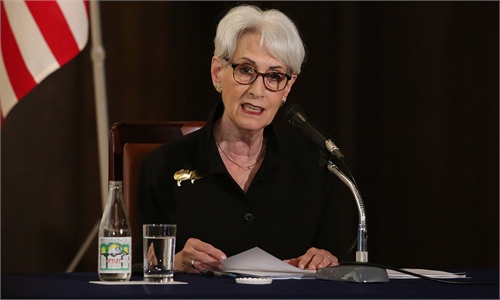
Wendy Sherman. Photo:CFP
US Deputy Secretary of State Wendy Sherman continued her visit to South Pacific countries and met with Solomon Islands Prime Minister Manasseh Sogavare in Honiara on Sunday, in what Chinese experts call a sinister attempt to sabotage China's growing ties with Pacific island countries as part of Washington's broad containment strategy against China.
The US' attempt to stir up tension in the Asia-Pacific region, including the South Pacific, in an attempt to contain China's rise will not be endorsed by the South Pacific countries, as the countries will try to avoid being reduced to chess pieces in the game between the great powers, Chinese experts noted.
During the meeting on Sunday, the two sides discussed bilateral cooperation including provision of COVID-19 vaccines and poverty reduction. They also discussed "developments affecting regional and global security," according to US official statement.
Earlier on Sunday, at a WWII memorial event in Honiara, Sherman rebuked certain governments that she said sought to "dismantle the rule-based international order," according to Reuters, which suggested that China was the target of her remarks.
Although Sherman did not further elaborate on the "developments affecting regional security" or "governments dismantling international rules," the statement was clearly directed at China and is another part of the US containment strategy against China in the Pacific, Yu Lei, chief research fellow at the research center for Pacific Island countries at Liaocheng University in East China's Shandong Province, told the Global Times on Sunday.
However, the US should pay attention to the fact that the rules that should be followed are those of the United Nations and not those of former colonial rulers, Yu said.
This high-level delegation of the US government is using the commemoration of a historical event and the friendship in their fight together against Japanese aggression in an attempt to re-establish emotional ties with the South Pacific island countries, Chen Hong, president of the Chinese Association of Australian Studies and director of the Australian Studies Centre at East China Normal University, told the Global Times on Sunday.
Sherman's visit reflects the panic in the White House over the security pact signed recently between China and the Solomon Islands, observers noted.
The visit exposed the US' sinister motive of comparing today's China to imperial Japan in the past in order to pit Pacific island nations against China, Chen said.
"The US has long had a plan - to mess up China's neighboring regions and the Asia-Pacific region, including the South Pacific, with the real intention of containing China's rise. However, this strategy of the US is difficult to achieve, especially in the long run," Yu said.
One of the aims of Sherman's visit is to prevent more island nations signing security pacts with China, while hoping the Solomon Islands will scrap its existing pact. Sherman is also believed to be pressuring the island nations to cancel cooperation projects under the Belt and Road Initiative, Yu said.
Yu noted that the South Pacific countries hope to strengthen cooperation with China and welcome its presence in the region. Economically, they want to seek more benefits and development from this partnership, and diplomatically, they want to balance the US' influence in the region and counteract the exploitation and political blackmail by the former colonial suzerainties led by the US.
The South Pacific countries have so far maintained a fairly independent diplomatic approach, viewing their relations with the US and China from their own interests and pursuing a judicious foreign policy of being "friends to all and enemies to none," Chen said. "They do not want to be chess pieces in the game between the great powers."
"This is not something that the US can force or use bribes to get the South Pacific nations to change their stances," Yu said.
Australian officials also attended the ceremony and gave a speech that echoed Sherman's, in which they highlighted the historical ties between the US, Australia and the Pacific Island nations during World War II.
While highlighting their ongoing alliance, no Western official mentioned how the West used the South Pacific as a nuclear testing ground during the Cold War and its lasting negative effects on the locals.
After her visit to the Solomon Islands, Sherman will visit Australia. The visit is expected to be a highly publicized one, considering that Australia has just followed the US in provoking China over the Taiwan question. Some Australian politicians have even suggested that Australia develop its own missiles, "given that a war in the Taiwan Straits could affect Australia," the Guardian reported on Sunday.
Yu pointed out that Australia's vested interests and position in the region are based on US regional hegemony and thus it follows the US containment policy closely. "How to further contain China and continue to put pressure on Pacific Island nations are both expected to be issues that are discussed by both sides," he said.
Australia's economy has encountered difficulties recently, and following the US in playing the provocative card against China is a choice it has made under pressure, he said.


